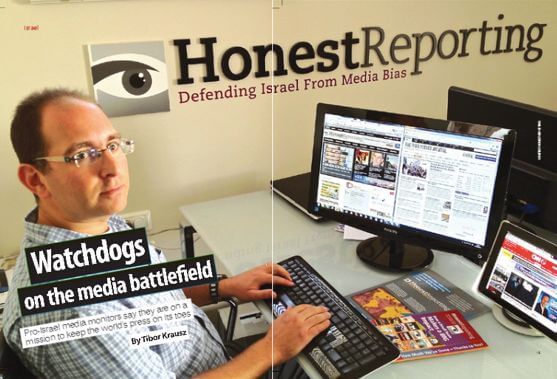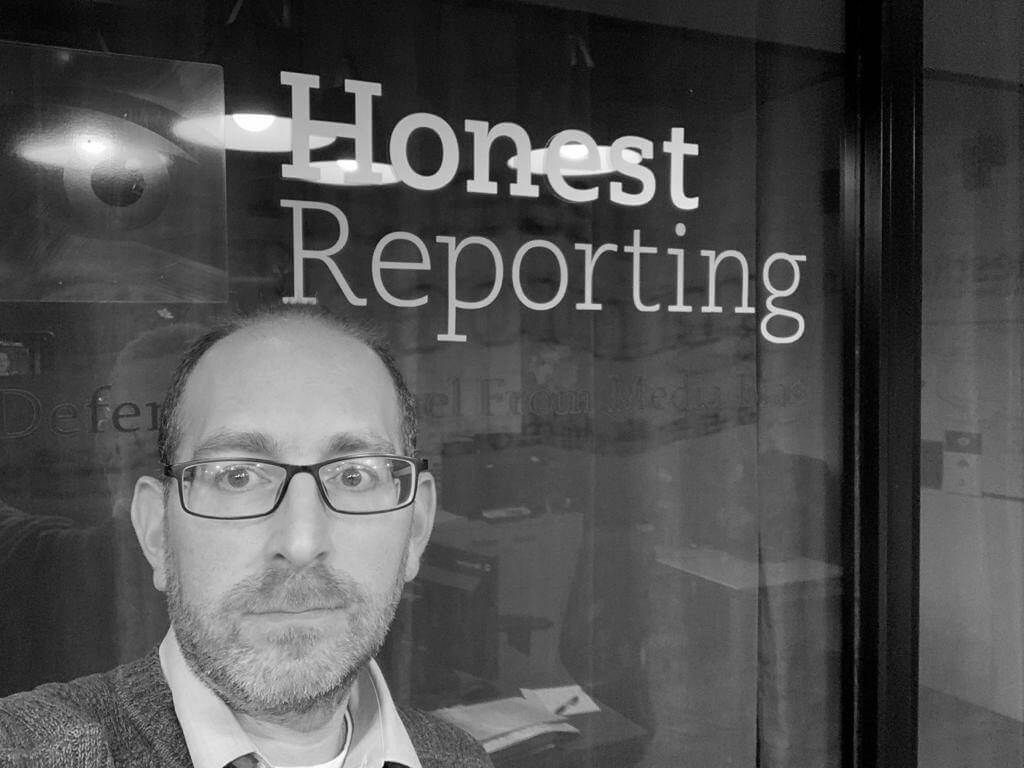HonestReporting’s Jerusalem office space is currently shuttered due to coronavirus restrictions. Writing this from my laptop at home almost feels like coming full circle as I prepare to say goodbye to the organization after over 14 years.
Back in November 2005 when I joined HonestReporting, the small editorial team would work remotely, albeit without the aid of Zoom. Israel had just emerged from the depths of the prolonged Palestinian terror campaign of the Second Intifada and social media was still in its relative infancy.
HonestReporting in its first five years of existence had already gained tens of thousands of online supporters and a brand associated with hard-hitting, exciting grassroots activism and immediate response to anti-Israel media bias. I wanted to take this to another level – keeping those qualities that had put HonestReporting on the map while increasing our credibility as an organization that got it right, educating not only our own subscribers but also the media and journalists whom we held to account.
I believe that I succeeded. For all of the inherently hostile journalists that we’ve pursued and held to account, there are also many who recognized our credibility and, sometimes behind the scenes, engaged with us in a positive and constructive way. I even have emails from journalists and editors expressing genuine appreciation for catching their errors. Indeed in today’s heated environment on social media where the discourse often descends into a competition for likes or retweets, it’s hard to believe that there are still media professionals whose reporting or critiques of Israel aren’t driven by malice. But they do exist and I’ve learned a great deal from personally discussing the issues with some of the journalists themselves.
Join the fight for Israel’s fair coverage in the news
I value enormously the access that my position has given me over the years. Israel is an incredible country in so many ways and HonestReporting has opened my eyes to so many remarkable experiences. Thanks to our regular Missions and field tours, I’ve had the opportunity to visit Israel’s borders, meet with and hear from a broad range of Israeli society, including minority communities, and see and hear so many things that ordinary Israelis, let alone tourists, never experience.
Sadly, I’ve also experienced the other side of that coin. I will never forget treading through the debris of homes in Ashkelon in the aftermath of direct Gaza rocket strikes or running for cover in Sderot during a Code Red alert. Or filming in Safed during the 2006 Second Lebanon War as a siren went off and a Hezbollah Katushya rocket landed nearby as a colleague and I crouched beside a wall. I’ve even descended into a Hamas terror tunnel discovered by the IDF on the Israeli side of the border.
Seeing a Hamas terror attack tunnel 4 myself I can believe how this could cost some $3m to build. If only Hamas would spend that money on its people instead of terror. #FreeGazaFromHamas pic.twitter.com/mMKKY3neZ9
— Simon Plosker (@SimonPlosker) July 24, 2018
That’s what really sets this job apart from so many others. It’s personal. As an Israeli and a Zionist Jew, of course it is. When a media outlet portrays the army you served in as child killers, it’s personal. When a journalist tries to justify the terror attack that took place just meters from your office, it’s personal. When someone questions your very right to exist in your own country, it’s personal. But I’ve always tried my best not to let the personal take precedence over the professional.
Israel is not perfect and, without giving my personal politics away, it’s never been about defending Israel from all criticism. I’ve always been proud of the political and religious diversity among my own staff that’s allowed us to coalesce around a consensus. Ultimately, the media may not like us or even agree with us but our professionalism has made sure that they, for the most part, respect us and appreciate that the primary motivation is ensuring Israel is treated fairly and accurately even when the news is bad.

Israeli public diplomacy has lurched from crisis to crisis over the years. The tiny country I made my home in 2001 found itself in the media eye of the Middle East storm, coming under sustained attack, not only from Palestinian terrorism and an international network of hate-driven activists, but from so many journalists and media outlets unwilling to treat Israel fairly or professionally. Have things changed? In some ways yes.
While Israel still attracts an unhealthy obsession from the world’s press, it certainly no longer feels like the sense of perpetual crisis that characterized my earlier years at HonestReporting. From major military conflicts with Hezbollah in 2006 and Hamas in 2008/09, 2012 and 2014, as well as public relations catastrophes such as the Mavi Marmara flotilla incident in 2010, Israel has learned a great deal from its mistakes. The country took too long to internalize what HonestReporting already knew – that the media is an inseparable part of the battlefield. I hope that I’ve played some small part in moving Israel’s mindset in that direction.
Sometimes it’s difficult to look back over such a long period and pick out the achievements or accomplishments. Of course there have been literally hundreds of media corrections. Some were simple. Others attracted wider attention beyond our own website. I’m often asked if there was any point to getting these corrections beyond holding the journalists to account, given the media’s propensity to bury the evidence. That I’ve ensured the evidence is online for perpetuity is precisely the point, and I get some satisfaction from that.
Some achievements are anecdotal and not always measurable. Others were more dramatic. For example, the 2010 firing of CNN’s Senior Editor of Mideast Affairs Octavia Nasr after we exposed her tweet lamenting the death of one of Hezbollah’s founding figures. Or the prolonged but successful battle in 2012 with The Guardian that eventually overturned a UK Press Complaints Commission ruling and forced a permanent change in The Guardian’s style guide to acknowledge that Tel Aviv should never be referred to as Israel’s capital, a precedent that continues to this day.
If there was ever an example of how we’d got the attention of the media, it was the UK Channel 4’s physical pursuit in a vain attempt to portray me as some sort of Elder of Zion, part of a conspiracy to bring the British media under Israel’s heel. It came as a nasty shock to be told that a film crew had just burst into our former Jerusalem headquarters demanding to know where I was and what I had to hide. Ironically, I was waiting at Ben-Gurion Airport for a flight to the UK and had nothing at all to hide. Still, after weeks of anxiety, it was almost flattering when the program was broadcast with all of its absurd charges. Clearly I must have been doing my job if media outlets believed that I exerted that much power!
Thank you to the thousands of our subscribers and readers who have followed HonestReporting over the years. It’s been a personal highlight to get out from behind the computer and meet with many of you. In Israel, the US, UK and South Africa, I’ve visited diverse communities that have given me the opportunity to address hundreds of adults and students. Travelling to diaspora communities around the world has certainly expanded my horizons. I’ve always considered education to be a primary focus. Not everyone may write a letter to the editor or share content on social media but if I succeeded in educating readers and audiences about the many complex issues surrounding Israel and the media coverage of the country, I have done my job.

I’ve been privileged to work with some incredible colleagues over the years, all of them committed professionals who go above and beyond for the cause and the organization. I don’t wish to single out individuals but I can’t not give a special mention to HR’s Deputy Managing Editor Pesach Benson and Missions and Events Director Suzanne Lieberman who have been with me in this journey since the beginning in November 2005. HonestReporting is a family. My colleagues are my friends and I shall miss them greatly.
Thanks also to my family for putting up with the countless distractions the job has brought. Despite my spending occasional time in potentially dangerous situations under rocket fire and spending far too much time glued to breaking news on my phone or laptop, my wife and children have supported my work throughout.
To my successor as Managing Editor, I can say that you will be joining an organization still on the up and ready to soar to even greater heights under the stewardship of CEO Daniel Pomerantz. I can also say that you will be taking on one of the greatest and most rewarding jobs you will ever have and I wish you and the entire organization the very best for what I know is a bright future defending Israel from media bias.


